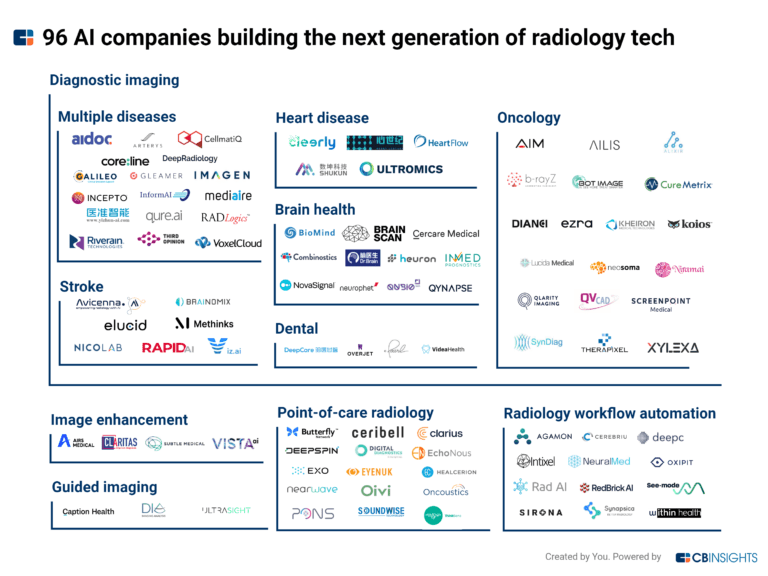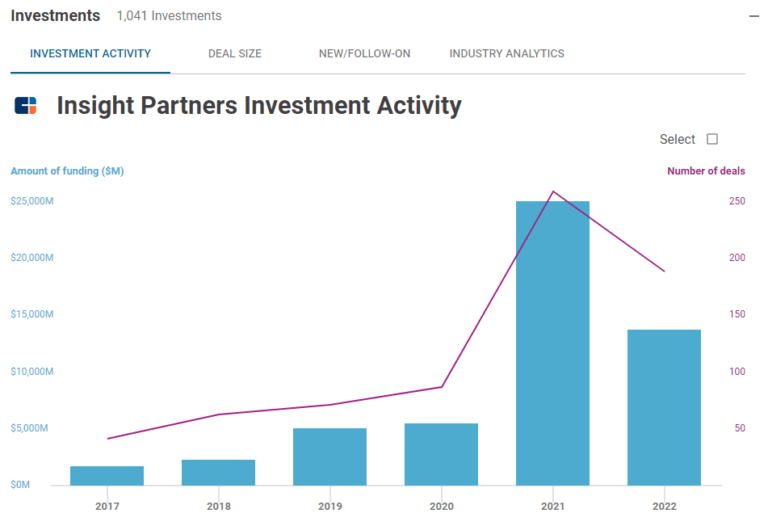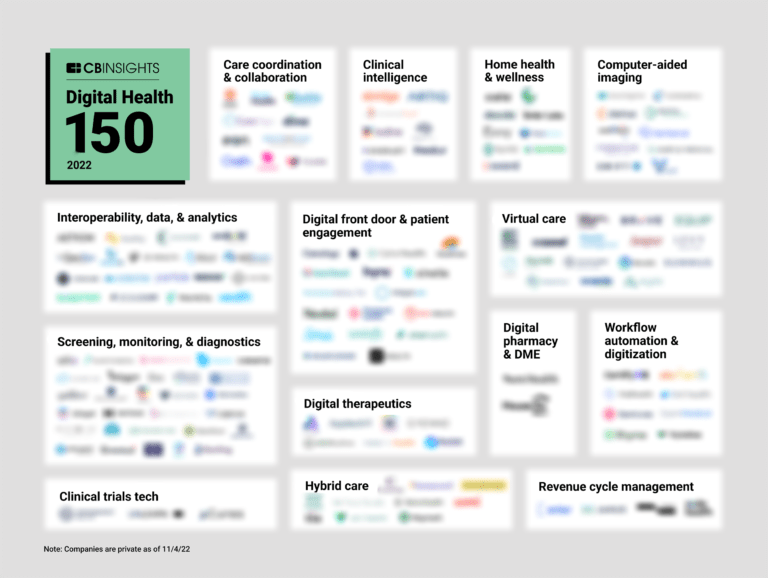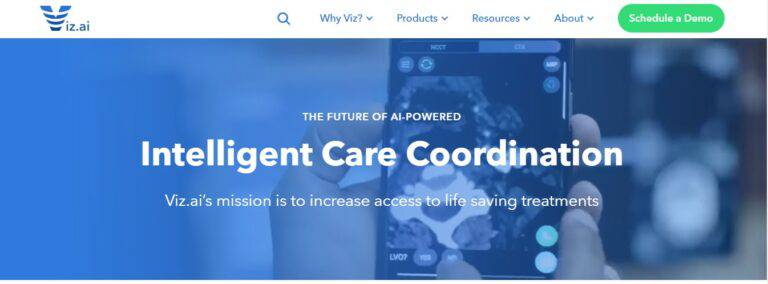
Viz.ai
Founded Year
2016Stage
Series D - II | AliveTotal Raised
$289.25MLast Raised
$40M | 2 yrs agoRevenue
$0000Mosaic Score The Mosaic Score is an algorithm that measures the overall financial health and market potential of private companies.
-7 points in the past 30 days
About Viz.ai
Viz.ai provides artificial intelligence (AI) enabled care coordination solutions in the healthcare sector. Their services include analyzing medical imaging data with cleared algorithms to provide insights and assessments for diagnosis and treatment decisions. Viz.ai serves healthcare providers and collaborates with life sciences partners. It was founded in 2016 and is based in San Francisco, California.
Loading...
Viz.ai's Product Videos

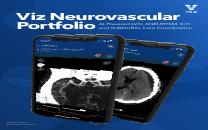
ESPs containing Viz.ai
The ESP matrix leverages data and analyst insight to identify and rank leading companies in a given technology landscape.
The radiology diagnostics (multiple modalities) market consists of solutions that offer various imaging modalities such as CT, MRI, ECG, Echo, and X-ray. The companies in this market leverage technology, including AI, in assisting with coordinating patient care, providing faster diagnoses, and improving radiologist efficiency and accuracy. It also offers insights into risk aspects of patient medi…
Viz.ai named as Leader among 15 other companies, including Aidoc, Butterfly Network, and Clarius Mobile Health.
Viz.ai's Products & Differentiators
Viz Neuro Suite
Viz Neuro Suite encompasses AI algorithms to detect suspected stroke, aneurysms, subdural hematomas and more.
Loading...
Research containing Viz.ai
Get data-driven expert analysis from the CB Insights Intelligence Unit.
CB Insights Intelligence Analysts have mentioned Viz.ai in 6 CB Insights research briefs, most recently on Apr 25, 2024.
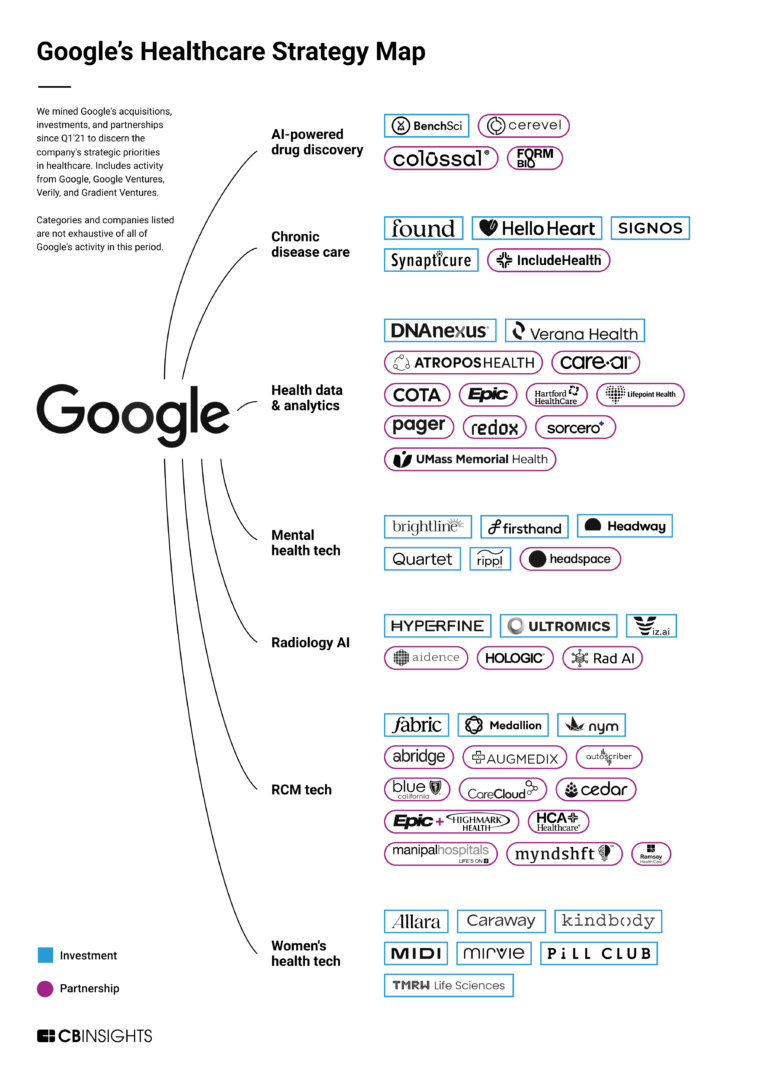
Expert Collections containing Viz.ai
Expert Collections are analyst-curated lists that highlight the companies you need to know in the most important technology spaces.
Viz.ai is included in 5 Expert Collections, including Unicorns- Billion Dollar Startups.
Unicorns- Billion Dollar Startups
1,270 items
AI 100
200 items
Digital Health 50
450 items
The most promising digital health startups transforming the healthcare industry
Digital Health
11,305 items
The digital health collection includes vendors developing software, platforms, sensor & robotic hardware, health data infrastructure, and tech-enabled services in healthcare. The list excludes pureplay pharma/biopharma, sequencing instruments, gene editing, and assistive tech.
Artificial Intelligence
7,221 items
Viz.ai Patents
Viz.ai has filed 24 patents.
The 3 most popular patent topics include:
- medical tests
- medical terminology
- emergency medicine

Application Date | Grant Date | Title | Related Topics | Status |
|---|---|---|---|---|
9/23/2022 | 1/14/2025 | Medical tests, Wireless networking, Computer networking, Medical imaging, Emergency medicine | Grant |
Application Date | 9/23/2022 |
|---|---|
Grant Date | 1/14/2025 |
Title | |
Related Topics | Medical tests, Wireless networking, Computer networking, Medical imaging, Emergency medicine |
Status | Grant |
Latest Viz.ai News
Mar 28, 2025
By Mika Newton AI’s reach depends on the environments in which it operates as well as how it is developed and deployed, highlighting a fundamental debate on whether we should push for regulation or opt for free-market-driven deregulation. Our nation’s healthcare system is facing a pivotal moment and unprecedented challenges that demand bold, innovative solutions. Workforce shortages, clinician burnout, skyrocketing costs, and deep-seated inequities—particularly in rural and underserved communities—have created a crisis in care delivery. At the same time, artificial intelligence (AI) has become the key talking point as the closest thing to a panacea to enhance efficiency, accessibility, and equity. Yet, the extent of AI’s reach depends on the environments in which it operates as well as how it is developed and deployed, highlighting a fundamental debate on whether we should push for regulation or opt for free-market-driven deregulation. The Case for Regulation Historically, regulation has been the cornerstone of public trust in healthcare. The establishment of the Food and Drug Administration (FDA) in 1906 played a critical role in ensuring the safety and efficacy of medicines and medical devices. Over the years, additional policies—such as Medicare’s Conditions of Participation, which hold hospitals to strict safety standards, and the National Institutes of Health (NIH) guidelines for clinical trials—have reinforced a culture of accountability. These safeguards have prevented harm, ensured ethical practices, and created a foundation of trust for patients and providers alike. In the domain of AI, regulation could serve an essential purpose. Left unchecked, it could introduce risks ranging from biased decision-making to outright harm. For example, the Optum health algorithm—which was found to recommend less care for Black patients than white patients with similar health conditions—highlights how unregulated tech (and particularly AI) could perpetuate systemic inequities. Regulatory frameworks, by enforcing standards for transparency, accountability, and fairness, can mitigate such risks and ensure that AI benefits everyone. Regulation also has the power to validate and enhance the trustworthiness of innovative technologies. The approval of IDx-DR , the first AI system authorized by the FDA to detect diabetic retinopathy, is a case in point. Its adherence to rigorous safety and efficacy standards demonstrated the company’s ability to meet critical healthcare needs, winning the hard fight for public trust. Moreover, regulation can act as a catalyst for adoption by instilling confidence among clinicians, patients, and institutions. For example, Viz.ai , a platform that accelerates stroke detection using machine learning, was validated with an FDA-approval that paved the way for its widespread adoption in hospitals across the United States. In this sense, regulation isn’t about creating restrictions but creating a foundation of trust that allows innovation to proceed in a sensible way. The Case Against Overregulation Excessive oversight can stifle innovation, delay the deployment of life-saving technologies, and create disproportionate burdens for smaller companies. Startups with limited resources often struggle to navigate complex regulatory requirements, which can entrench the dominance of larger, more established players. Drawn-out approval processes for tools like Butterfly iQ , an AI-powered handheld ultrasound device, serve as a case in point. While ultimately transformative, the delays in its regulatory pathway limited its immediate impact, particularly in underserved communities where such technologies are needed most. In some cases, strategic deregulation has shown how loosening constraints can lead to rapid innovation and expanded access to care. COVID-19 is a powerful example. Temporary policy changes during the pandemic allowed telehealth platforms like Amwell and Babylon Health to scale quickly and meet critical needs. Babylon Health, for example, leveraged AI for symptom checking and virtual consultations that offered accessible healthcare options to underserved populations. A Balanced Approach The solution to this debate does not lie in choosing one approach over the other but in finding a balance that leverages the strengths of both regulation and deregulation. Regulation can ensure that AI tools are safe, effective, and equitable, while deregulation can foster innovation and reduce barriers to entry. Together, these forces can create an environment in which AI thrives responsibly. Adaptive policy models offer a promising way forward. Regulatory sandboxes, for instance, allow companies to test new AI technologies in controlled environments and balance the need for oversight with the flexibility to innovate. Similarly, tiered oversight can differentiate between high-risk AI applications (such as diagnostic tools that warrant rigorous scrutiny) and lower-risk tools (like administrative automation that can be developed with more leniency). Importantly, this balanced approach requires collaboration among regulators, innovators, and stakeholders across the healthcare continuum. Policymakers must remain agile and ensure that regulations evolve alongside technological advancements rather than lag behind them. At the same time, developers and companies must embrace transparency and accountability as foundational principles, recognizing that trust is not a barrier to success but a bridge to long-term adoption. A Vision for the Future AI has the potential to revolutionize healthcare by addressing its most pressing challenges, from alleviating clinician burnout to closing gaps in access and equity. But realizing this potential requires a regulatory environment that protects patients while encouraging innovation. It is not a matter of choosing between safety and speed, oversight and flexibility, or trust and progress. Instead, it is about harmonizing these priorities to build a healthcare system that leverages AI to deliver better outcomes for everyone, everywhere. The future of healthcare depends on our ability to strike this balance. By combining the best of regulation and deregulation, we can create a system that meets today’s challenges while paving the way for tomorrow’s breakthroughs. About The Author
Viz.ai Frequently Asked Questions (FAQ)
When was Viz.ai founded?
Viz.ai was founded in 2016.
Where is Viz.ai's headquarters?
Viz.ai's headquarters is located at 548 Market Street, San Francisco.
What is Viz.ai's latest funding round?
Viz.ai's latest funding round is Series D - II.
How much did Viz.ai raise?
Viz.ai raised a total of $289.25M.
Who are the investors of Viz.ai?
Investors of Viz.ai include CIBC Innovation Banking, Kleiner Perkins, Charles River Ventures, Google Ventures, Susa Ventures and 15 more.
Who are Viz.ai's competitors?
Competitors of Viz.ai include Medical Brain, Quibim, Aidoc, Subtle Medical, AIRS Medical and 7 more.
What products does Viz.ai offer?
Viz.ai's products include Viz Neuro Suite and 4 more.
Loading...
Compare Viz.ai to Competitors
RADLogics is a healthcare software company that provides AI solutions for the medical imaging sector. The company offers machine-learning image analysis tools for the detection and report generation processes for imaging data such as CT and X-ray scans. RADLogics serves the healthcare industry, focusing on radiology departments that use AI technologies in their diagnostic workflows. It was founded in 2010 and is based in New York, New York.
EnvoyAI, now part of TeraRecon, focuses on advanced visualization and artificial intelligence in the medical imaging sector. The company offers AI-powered solutions to enhance medical imaging workflows, including tools for radiology, cardiology, and neurology. These solutions aim to improve patient care by providing insights and decision support to healthcare professionals. It was founded in 2016 and is based in Durham, North Carolina.

Qure.ai specializes in leveraging artificial intelligence to enhance healthcare accessibility and affordability and focuses on the healthcare sector. The company provides AI-powered tools for medical image analysis, including chest x-ray interpretation and management of various conditions such as lung nodules, strokes, and heart failure. Its solutions are designed to assist healthcare professionals in diagnosing and treating diseases, with a significant presence in the global healthcare AI market. It was founded in 2016 and is based in Mumbai, India.

Aidoc works as a clinical company that specializes in healthcare technology. The company offers solutions that integrate into existing healthcare infrastructure. Aidoc's products primarily serve the cardiovascular, neuro, and radiology sectors within the healthcare industry. It was founded in 2016 and is based in New York, New York.

Densitas provides artificial intelligence solutions within the breast cancer screening domain. The company offers products that automate breast density assessments, track mammography quality, and help in compliance with regulatory standards such as the Mammography Quality Standards Act (MQSA). It primarily serves the healthcare sector. The company was founded in 2011 and is based in Halifax, Canada.

Mirada Medical specializes in medical imaging software within the healthcare technology sector. The company offers software applications that facilitate image analysis for cancer diagnosis and treatment, incorporating AI and automation to enhance clinician productivity and patient care. Mirada Medical's products are primarily utilized in the radiation oncology, diagnostic imaging, and interventional radiology sectors. It was founded in 2000 and is based in Oxford, United Kingdom. Mirada Medical operates as a subsidiary of CTI Molecular Imaging.
Loading...

